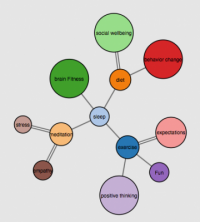Transparency is extremely important to us, so we are letting you know that we may receive a commission on some of links you click on from this page. See our disclaimer.
 The MIT Media Lab “launched a wellness initiative designed to spark innovation in the area of health and wellbeing, and to promote healthier workplace and lifestyle behaviors,” the school announced.
The MIT Media Lab “launched a wellness initiative designed to spark innovation in the area of health and wellbeing, and to promote healthier workplace and lifestyle behaviors,” the school announced.
“With support from the Robert Wood Johnson Foundation (RWJF), which is providing a $1 million grant, the new initiative will address the role of technology in shaping our health, and explore new approaches and solutions to wellbeing. The program is built around education and student mentoring; prototyping tools and technologies that support physical, mental, social, and emotional wellbeing; and community initiatives that will originate at the Media Lab, but be designed to scale.”
“The program begins with the fall course ‘Tools for Well Being,' followed by ‘Health Change Lab' in the spring. In addition to concept and technology development, these courses will feature seminars by noted experts who will address a wide range of topics related to wellness. These talks will be open to the public, and made available online. Speakers will include Walter Willett, a physician and noted nutrition researcher; Chuck Czeisler, a physician and sleep expert; Ben Sawyer, a game developer for health applications; Matthew Nock, an expert in suicide prevention; Dinesh John, a researcher on health sciences and workplace activity; Lisa Mosconi, a neuroscientist studying the prevention of Alzheimer’s disease; and Martin Seligman, a founder of the field of positive psychology.”
“The RWJF grant will also support five graduate-level research fellows from the Program in Media Arts and Sciences who will be part of a year-long training program. The funding will enable each fellow to design, build, and deploy novel tools to promote wellbeing and health behavior change at the Media Lab, and then at scale.”
Other aspects of the initiative include:
- A monthly health challenge that would engage the entire lab, with review and analysis of each month's deployment to help inform the next month's initiative.
- Pairing students with one another — to build awareness of wellbeing as a social function, not just a perosonal goal, and to draw on people’s inclination to solve the problems of others differently than their own.

0 Comments